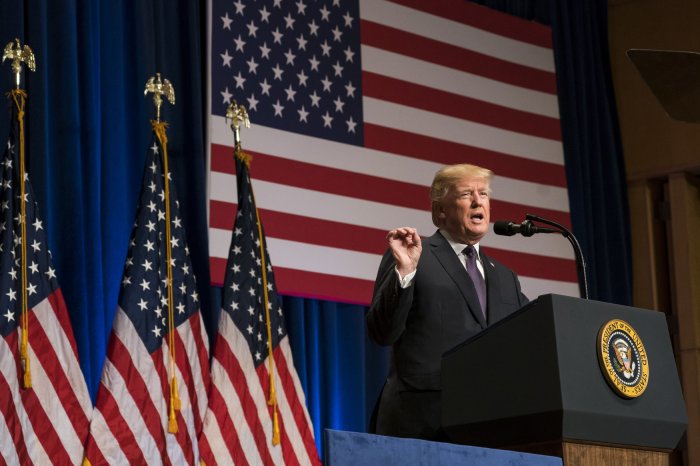Updated: Dec. 22, 2017 at 12:39 PM
This week in Washington (65 images)
President Donald Trump speaks about his "America First" national security strategy, Homeland Security addresses the WannaCry malware attack and congressional Republicans pass a $1.5 trillion tax bill the week of December 18, 2017, in Washington, D.C.

President Donald J. Trump speaks on his "America First" national security strategy in the Ronald Reagan Building and International Trade Center on Monday. Trump's strategy puts American sovereignty over international relations, particularly on issues of border security. Photo by Jim Lo Scalzo/UPI
License photo | Permalink

President Donald Trump's 68-page foreign policy vision lists threats from Iran, North Korea, Russia and China. "My administration's National Security Strategy lays out a strategic vision for protecting the American people and preserving our way of life, promoting our prosperity, preserving peace through strength, and advancing American influence in the world," Trump said. "We will pursue this beautiful vision -- a world of strong, sovereign and independent nations, each with its own cultures and dreams, thriving side by-side in prosperity, freedom, and peace -- throughout the upcoming year." Photo by Jim Lo Scalzo/UPI
License photo | Permalink

Thomas P. Bossert (L), assistant to the president for Homeland Security, and Jeanette Manfra, assistant secretary of Homeland Security for cybersecurity and communication, deliver a briefing on North Korean involvement with the WannaCry Malware Attack, at the White House on Tuesday. The Trump administration said North Korea is responsible for WannaCry, the ransomware attack that infected hundreds of thousands of computers worldwide and crippled parts of Britain’s National Health Service in May. Photo by Kevin Dietsch/UPI
License photo | Permalink

"The U.S. today publicly attributes the massive 'WannaCry' cyberattack to North Korea," Thomas Bossert wrote in an op-ed published in The Wall Street Journal. "The attack was widespread and cost billions, and North Korea is directly responsible." The ransomware cyberattack targeted companies and governments in at least 150 countries beginning May 12, when the malware virus demanded $300 per computer to restore access after taking control of computer systems. Bossert asserted in The Wall Street Journal that other governments and private companies agree with the United States' findings, stating Britain also attributes the attack to North Korea and Microsoft has traced the attack to cyber affiliates of the North Korean government. Photo by Kevin Dietsch/UPI
License photo | Permalink
Advertisement